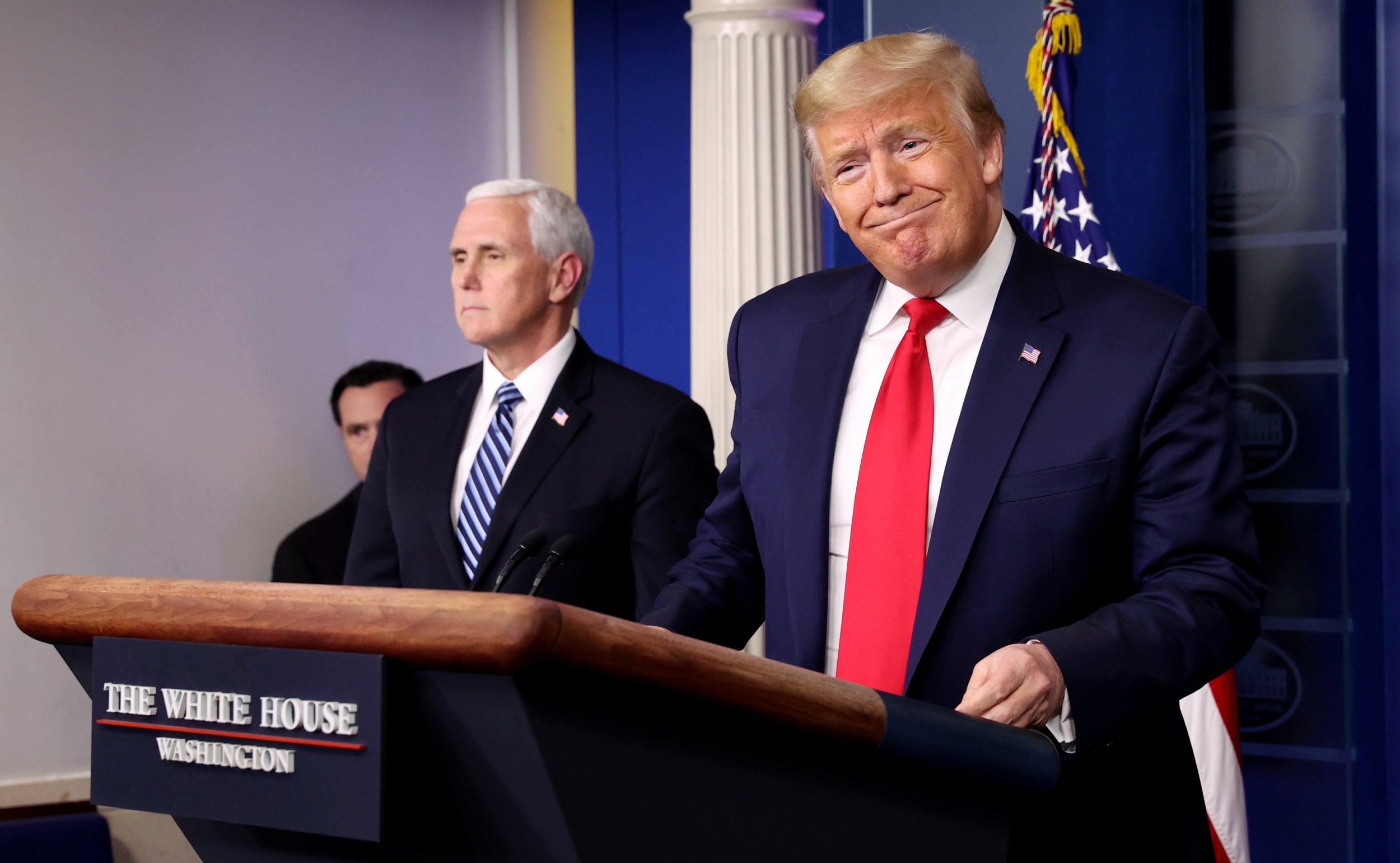Don't fall for the rhetoric — Trump's administration knew all about coronavirus. They chose not to act
Like with Katrina and 9/11, everyone in government was briefed multiple times and told exactly what to do — but then ignored the experts


Your support helps us to tell the story
From reproductive rights to climate change to Big Tech, The Independent is on the ground when the story is developing. Whether it's investigating the financials of Elon Musk's pro-Trump PAC or producing our latest documentary, 'The A Word', which shines a light on the American women fighting for reproductive rights, we know how important it is to parse out the facts from the messaging.
At such a critical moment in US history, we need reporters on the ground. Your donation allows us to keep sending journalists to speak to both sides of the story.
The Independent is trusted by Americans across the entire political spectrum. And unlike many other quality news outlets, we choose not to lock Americans out of our reporting and analysis with paywalls. We believe quality journalism should be available to everyone, paid for by those who can afford it.
Your support makes all the difference.The fundamental obligation of any government is to keep its citizens safe. In a complex, representative democracy like the United States, these tasks must be delegated to public officials who have the expertise and judgment to do so honestly, transparently and competently, while the rest of us can go about the business of our daily lives.
As Michael Lewis brilliantly illustrated in The Fifth Risk, the US career bureaucracy is filled with people who are experts in anticipating disasters and planning how to avoid or mitigate them. Yet political leadership has repeatedly and at the worst possible times failed in performing its essential function of assuring that the American people are safe.
On issue after issue, from September 11 to Hurricane Katrina to climate change and now the novel coronavirus, politicians have attacked, downplayed or buried “inconvenient truths” that they don’t want to address for their own narrow purposes. What we hear is the litany of excuses that “No one could have anticipated x.” Yet the major disasters of this century not only could have been anticipated; they were anticipated within the government and every one of them could certainly have been mitigated if not entirely avoided.
President Trump is the apotheosis of the usual game-plan: ignore, deny, lie, blame others and punish the messenger. But this time, the pile of corpses will be much, much higher.
September 11
Osama Bin Laden was nothing if not transparent in his agenda. Between January 20, when George W Bush was inaugurated, and September 10, 2001, more than 40 articles regarding Bin Laden made it into the President’s Daily Briefing, which was generally attended by the President, the Vice President, the National Security Advisor and the Director of the CIA, who gave the oral briefing.
The intelligence reporting consistently described upcoming attacks as occurring on a calamitous level, indicating that they would cause the world to be in turmoil. The headline of a June 30 briefing was stark: “Bin Laden Planning High-Profile Attacks.” On July 31, an FAA circular alerted the aviation community to “reports of possible near-term terrorist operations.“ The August 6 Presidential Briefing, “Bin Laden Determined To Strike in US,” referenced FBI information regarding preparations for hijackings or other types of attacks, including surveillance of federal buildings in New York.
So what happened? The CIA did not share information with the FBI or vice versa. The domestic agencies thought the threat was foreign; the foreign agencies told the National Security Council. The National Security Council said it had ordered the FBI to step up terrorism operations; the FBI denied it. The lights were “blinking red,” but no one was in charge and no one took responsibility.
Nearly 3,000 people died.
Katrina
The Hurricane Katrina disaster followed a similar path to disaster. The risk was specifically identified by experts and specific precautions prescribed. A 113-page disaster plan predicted that in a major storm in Louisiana (which happen with increasing frequency), the levees in New Orleans could break and there would be "thousands of fatalities," "floating coffins," and "large quantities of hazardous waste" that "would result in airborne and waterborne contamination."
The plan called for evacuations to begin three days before the storm made landfall. In reality, they began 20 hours before. Critical resources were supposed to be stored in place before the storm hit by FEMA; they weren’t. The mayor and governor blamed the Bush administration for the slow response. Federal officials said that hurricane preparation was a state and local responsibility and indicated the requests for help were not specific.
Once again, the experts had predicted and planned for the risk but a failure of responsibility at the top led to nearly 2,000 deaths.
Coronavirus
Now we are dealing with something far worse in terms of lives, potential economic impact and duration. Once again, there is a crisis that was anticipated and could have been significantly mitigated. There have been years of pandemic planning for a pathogen that could move swiftly, lethally and globally. Bill Gates warned in 2015 that “a pandemic disease is the most predictable catastrophe in the history of the human race, if only because it has happened to the human race so many, many times before.”
President Obama’s outgoing homeland security advisor led the Trump team in a simulation of how an airborne respiratory pandemic would halt international travel, upend global supply chains, tank the stock market, and burden healthcare systems. Yet the Trump administration cut back CDC funding and eliminated the National Security Council unit dealing with pandemics.
In 2019, HHS conducted an extensive simulation of a scenario where a respiratory virus, dubbed "The Crimson Contagion," began in China and rapidly spread through the US. A draft report raised red flags about several shortcomings currently arising in the federal government's response and messaging to contain the virus.
A few months later, in November 2019, Covid-19 broke out in Wuhan. According to an ABC News Report, the National Center for Medical Intelligence, through data intercepts and satellite imagery, identified the virus outbreak as a potential threat to US troops in the region by the end of November. Analysts concluded it could be a cataclysmic. Top White House and Pentagon officials were briefed multiple times, beginning in November, and failed to make the basic connection that airborne pathogens in a globalized world travel everywhere.
The official notification by China to the WHO occurred on December 31. Even then, with serious leadership, millions of tests could have been ready as well as PPE provided for healthcare workers. Had testing been done, the curve could have been flattened so that triage of besieged hospitals would not be besieged.
Peter Navarro, the China-hawk trade advisor, wrote a memorandum on January 29, the day before the first case in the US was identified, stating: “The risk of a worst-case pandemic scenario should not be overlooked.” The President claims he never saw the memo (he is not a reader), although presumably many senior-level people saw it and surely Navarro if not others would have conveyed that information to him.
On February 23, when there were 14 cases in the US and still no deaths, Navarro wrote another memo describing the “increasing probability of a full-blown Covid-19 pandemic that could infect as many as 100 million Americans, with a loss of life of as many as 1.2 million souls.” By this time, the Coronavirus Task Force had been formed and Navarro wrote to its members: “Any member of the Task Force who wants to be cautious about appropriating funds for a crisis that could inflict trillions of dollars in economic damage and take millions of lives has come to the wrong administration.”
But Navarro was in fact identifying the President, who was denying the severity and dithering about making a $2.5 billion request. Congress appropriated $8.3 billion on March 4; It has now appropriated more than $2 trillion, with more contemplated. Much of this might have been unnecessary if the President had not wasted 70 days talking about hoaxes and the flu and had instead implemented mass testing and social distancing. Make no mistake: the Trumpian brew of hubris, narcissism, blaming and incompetence will kill tens if not hundreds of thousands needlessly.
This is not about partisanship; it is about a failure of accountability, honesty and foresight. Our leaders seem unable or unwilling to act in response to risk. Only when disaster cannot be ignored, bullied or gamed does top leadership become engaged. And this failure to govern competently in a world of dangerous uncertainty kills people — lots of people.
I stay awake nights thinking about all that I have learned over the past few weeks. It is not my job, or any citizen’s job, to learn these things, but I feel compelled to understand because the failure, incompetence and dishonesty of our government — and governments around the world — have been so profound and so profoundly disconcerting.
Join our commenting forum
Join thought-provoking conversations, follow other Independent readers and see their replies
Comments